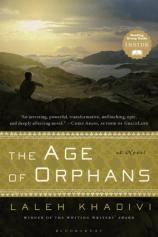Reading Group Guide
Discussion Questions
The Age of Orphans

1. A Kurdish proverb, “It is more difficult to contend with oneself than with the world,” serves as an epigraph to The Age of Orphans. How does this proverb speak to Reza Khourdi’s life?
2. Reza’s fascination with birds --- from the boy’s flying fantasies to the captain’s pet falcon --- endures throughout his lifetime. What is the source of his bird obsession? When the birds speak in the novel, proclaiming, “Of earth, we see all” (47), what do they see in the boy and his people?
3. Maman tells her own story of orphanhood and coming-of-age. What qualities has Maman passed along to her son? How does her story resemble her son’s, and how does it differ?
4. Describe the boy’s emotions during his father’s violent death. What is the source of the boy’s shame, as well as his choice to banish his father to “a damp purgatory of forget and never-remember”? (67) What impact will these forgotten emotions have on the boy’s future?
5. Images of boots recur throughout The Age of Orphans. Discuss passages where boots appear, and consider what they might symbolize to Reza at different times in his life.
6. Consider the significance of Reza’s name. Why is he nameless until he is conscripted into the army? What is the meaning of his new name? Why is he assigned the third name “Pejman,” in addition to “Reza Khourdi”?
7. Discuss Reza’s military training and social life in the army barracks. When is he able to find community with his fellow cadets, and when does he part from his peers? Why do the boys reassert ethnic differences after a like-minded period as “sameskins, brethren”? (88) Why does Reza ultimately lie to betray a fellow conscript, the Baluch twin, and what are the consequences of his lie?
8. When Reza believes he is fifteen years old, the number is actually “an orphan age, as declared by the spurious newlyweds Baba Shah and Maman Iran.” (114–15) What is the difference between a calendar age and an “orphan age”? How does this “orphan age” assert itself upon Reza’s identity?
9. Describe Reza’s experience in Saqqez, the Kurdish village he invades with the shah’s army. How do Reza’s actions in Saqqez determine his future as a soldier and as a Kurd? How do his victims, particularly the little boy with a similar face and the girl he rapes, respond to his violent acts?
10. What are Reza’s first impressions of Meena as he watches her father’s funeral procession from a rooftop in Tehran? What does he see in Meena? Which of her qualities does he not yet see?
11. The Khourdis’ wedding night is narrated from both Reza’s and Meena’s points of view. Compare their descriptions of the marriage and its consummation. How do their perspectives of this event differ? How do their different experiences bode for the future of the marriage?
12. Why does the shah’s army command Reza to return to Kermanshah? What is the reasoning behind this “rare move … to put [him] back so close to the nest?” (202) Does Reza fulfill the army’s expectations in Kermanshah? Why or why not?
13. How do the Kurds in Kermanshah react to the formation of Iran as a nation? How do they view outsiders like the shah’s soldiers? How do outsiders view the Kurds? What is their attitude toward Reza and his changes to their schools, farming practices, and other elements of daily life? How do they handle the open secret of Reza’s Kurdish identity?
14. Discuss Reza’s connection to the land, from the farmlands of his childhood to the winding streets of Tehran to the Zagros Mountains outside Kermanshah. At what points in his life is he particularly attached to nature and the land? In the end, does Reza have a true homeland? Why or why not?
15. The struggles of Reza and his tribe are representative of the larger Kurdish struggle of the 20th century. What does Reza’s experience show us about some of the personal elements at work behind larger geopolitical developments? How do the tribal populations of the Middle East and ancient internal conflicts play a role in the current crises that plague the region?
16. After Meena’s death, Reza says of his children, “I have orphaned them just as I was once orphaned and now they have absconded from these stone palaces and abandoned me in the shadows of their escapes.” (286) What are Reza’s motivations for orphaning his children? What consequences, if any, does he suffer for the murder? What are some possible futures for Reza and Meena’s six children --- how might this cycle of violence and orphans continue or end?
17. Discuss Laleh Khadivi’s unique writing style, and point to passages that are particularly poetic or moving. What is the effect of the multiple perspectives that contribute to the novel? How would the novel be different if it were narrated solely from Reza’s point of view?
The Age of Orphans
- Publication Date: March 2, 2010
- Paperback: 304 pages
- Publisher: Bloomsbury USA
- ISBN-10: 1608190420
- ISBN-13: 9781608190423








